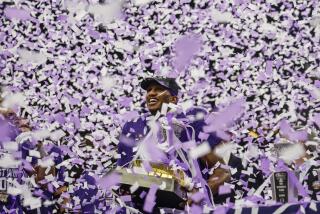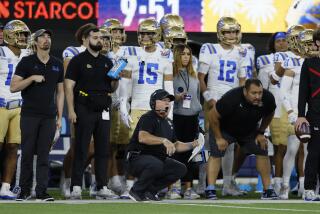Pac-12 football coaches say poor bowl record is not an indictment of the conference
- Share via
The Pac-12 Conference didn’t put a team in the College Football Playoff last season and was one loss away from throwing a gutter ball when it went bowling.
A 1-8 record in bowl games was the worst ever for a Power Five conference, breaking the Big Ten’s 1-6 mark of futility from 2008. Utah’s 30-14 victory over West Virginia in the Heart of Dallas Bowl prevented a shutout considering that UCLA, USC, Stanford, Washington, Washington State, Arizona, Arizona State and Oregon all lost their bowl games.
Not that Pac-12 Commissioner Larry Scott sent a thank-you card to Salt Lake City.
“Absolutely not,” Utes coach Kyle Whittingham cracked Monday on a Pac-12 coaches teleconference, “but I’m expecting one and I’m sure it’s in the mail.”
Several coaches said a conference’s bowl record was not a good measure of its relative strength. Colorado coach Mike MacIntyre pointed to key players sitting out bowl games and injury discrepancies between participating teams. Stanford coach David Shaw, whose Cardinal dropped a 39-37 thriller against Texas Christian in the Alamo Bowl, said that bowl games were nothing more than a snapshot of a team on one day.
“One team made a few more plays than the other team, so that’s how it goes,” Shaw said of Stanford’s bowl loss, “but that game doesn’t say anything about our conference. So that’s what I think gets blown out of proportion. You’d love to have a stronger showing, but when it’s all said and done, I think the strength of our conference is understood and what we do from here on out is really on the individual teams.
“If we go undefeated in bowls next year, it doesn’t mean our conference is any better; it just means that those teams won on those days.”
Whittingham said a conference’s bowl results are cyclical and didn’t think one down year was any sort of red flag considering that Pac-12 teams were 3-3 in bowl games during the 2016 season and 6-4 in 2015.
“It’s just a situation where some years, certain conferences are better than others in bowl play,” Whittingham said, “and that’s just how things shook out last year.”
He’s still scheming
Chip Kelly was known as an innovator during his four seasons at Oregon, parlaying his blur offense into a whirlwind of victories and major bowl game appearances.
So what has he done to remain on the cutting edge in his return to college football at UCLA? Apparently not much.
“You can run really cool plays,” Kelly said, “but if you don’t have the right personnel to run those cool plays then you’re not going to be very successful. So for us it’s always about trying to match what our players can do and put them in position to make plays. So it’s got nothing really to do with staying on the cutting edge or any edge, to be honest with you.”
Kelly said he couldn’t assess the level of talent he inherited from predecessor Jim Mora after the completion of spring practice.
“We have nothing to compare it against; we don’t play anybody, so it’s all kind of relative,” Kelly said. “Who’s the best at that position is what you’re looking for and what are their strengths and weaknesses and how do you implement them in a game plan?”
A fresh start?
UCLA’s Dorian Thompson-Robinson and USC’s J.T. Daniels are among the quarterbacks trying to win starting jobs as true freshmen. It’s no longer mission improbable because of the increasingly precocious nature of college football.
USC coach Clay Helton said the rise of year-round training that includes summer camps and seven-on-seven tournaments has helped put incoming freshmen on more equal footing with college veterans.
“To see the progress of young people and where they are today compared to 20 years ago, they are so much further ahead than when I originally started my career,” Helton said. “They are more advanced, more mature, as far as their game goes.
“They’re already reading coverages and given two plays that can get us in the right play. I’ll never forget J.T. Daniels being here for a seven-on-seven camp that we were having and he was calling all the plays, so it’s amazing how far advanced not only from a physical nature but the mental aspect of the game is where I think things have changed because they’re truly thinking about it year-round.”
Inquiring mind
Leave it to Washington State coach Mike Leach to turn the teleconference format on its head and ask a question.
Asked why he didn’t like a new rule designed to increase safety that will place the ball at the 25-yard line on kickoffs caught inside that yard marker, Leach asked the reporter, “Well, why don’t you like it?”
Informed that the reporter thought field position was part of the strategy of the game and that a team with a talented kicker and good special teams unit should be able to take advantage of pinning teams deep on their side of the field, Leach said, “I agree 100% and I think there aren’t very many of these rules changes that haven’t done something to limit strategy and even though they’re well-intended, they haven’t had that effect.
“Most of them basically are the equivalent to the halo rule and we’re still caught up in the halo-rule syndrome, failed with the halo rule, took two years to eradicate it and ever since then we’re determined … to get one and make it right and say, ‘Oh my god, you’re a genius. You came up with this brilliant rule.’ Failure after failure after failure and this is the latest piece of that. And there will be one next year too.”
Follow Ben Bolch on Twitter @latbbolch
More to Read
Go beyond the scoreboard
Get the latest on L.A.'s teams in the daily Sports Report newsletter.
You may occasionally receive promotional content from the Los Angeles Times.











